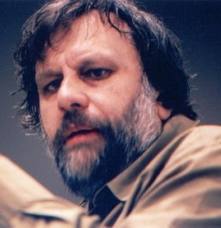Žižek mania

By TOBY LICHTIG
Which contemporary intellectual generates more words than any other? It's an impossible question, and perhaps a foolish one, but sifting through the sacks of books that arrive daily at the TLS, one is tempted to come up with a definite answer: Slavoj Žižek.
The Slovenian philosopher, critic, essayist, journalist and Lacanian-Hegelian-Marxist theorist has an apparently infectious habit of generating streams of noun-heavy theorizing about subjects as diverse as religion, food, violence, psychoanalysis, media, terrorism, fashion, geopolitical upheaval, Lacanian-Hegelian-Marxist theory and Kung Fu Panda; and the more he writes, the more, inevitably, he gets written about.
In the past two years alone, along with countless reviews and essays, Žižek has published The Year of Dreaming Dangerously; Less Than Nothing: Hegel and the shadow of dialectical materialism; God in Pain: Inversions of apocalypse (with Boris Gunjević); and Hegel and the Infinite: Religion, politics, and dialectic (with Clayton Crockett and Creston Davis); while recent books about the man include Žižek: A guide for the perplexed (2012) by Sean Sheehan; The Symbolic, The Sublime, and Slavoj Žižek's Theory of Film (2012) by Matthew Flisfeder; Žižek and Communist Strategy (2012) by Chris McMillan; and Žižek Now: Current perspectives in Žižek studies (2012), edited by Jamil Khader and Molly Anne Rotherberg.
There is an International Journal of Žižek Studies and a Centre for Ideology Critique and Žižek Studies (at Cardiff University), not to mention innumerable conferences and seminars. Žižek is the subject of various documentaries, including Liebe Dein Symptom wie Dich selbst! (1996) and Žižek! (2005), and he has starred in a slew of films including Sophie Fiennes's The Pervert's Guide to Cinema (2006) and The Pervert's Guide to Ideology (2012), and Jason Barker's Marx Reloaded (2011). As if to underline his multidisciplinary approach, the Royal Opera House has recently commissioned a series of works inspired by Žižek's writings.
Now there is, of course, nothing wrong with being prolific and popular, and there is a huge amount to be admired about the diverse and provocative corpus of Slavok Žižek the thinker. But there are times when, it seems, Žižek mania transcends scholarship and spills over into outright hero worship. This impression is partially upheld by the hyperbolic praise he tends to generate in the media. Žižek is described as, for instance, "the world's hippest philosopher" or "the Elvis of cultural theory", even if he himself refutes such claims. And what is even more remarkable about the Žižek craze is that, despite his pop star status and apparently mass appeal, the sort of writing he inspires tends towards quite the opposite of pop clarity and brevity. Take this single-sentence excerpt from Žižek Now, drawn more or less at random:
Contemporary post-political societies are marked not only by an allegedly successful overcoming of earlier forms of "totalitarian" universal politics in the name of "peaceful" and pragmatic deliberations aiming at consensus, but also by the more or less implicit ideological conviction that violence presents no longer an eminently political problem; that is, violence today appears paradoxically as disavowed violence both in the quasi-naturalist form of the objective-anonymous machine of market forces simply taking its course and in ubiquitous spurious claims as to the final realization of an allegedly multi-cultural and even postcolonial coexistence of different cultures and ethnicities, or, on the other hand, as "excessive" and "irrational" violent eruptions, supposedly unrelated to the current socioeconomic order and the persistence of neo-colonialist structures of subjugation and exclusion, to be dealt with by decreeing different kinds of statist police actions.
Did you get all that?
It's not that it doesn't make sense, because it sort of does, in its own inelegant way. But my concern is that writing such as this carries with it a wearisome sense of cultural theory by numbers, of regurgitation rather than interrogation; and one is sometimes tempted to wonder where the Žižek mania is leading us. The philosopher himself remains ambiguous about his followers and fame (as he is about so much else) and has claimed to "despise public appearances" and never to have read the International Journal of Žižek Studies.
I wonder what would happen if we, collectively, gave Žižek a rest for a few months. Could we cope with the silence? Are we up to the challenge? Just a thought.
Peter Stothard's Blog
- Peter Stothard's profile
- 30 followers



